|
|
|
Sort Order |
|
|
|
Items / Page
|
|
|
|
|
|
|
| Srl | Item |
| 1 |
ID:
141132
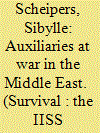

|
|
|
|
|
| Summary/Abstract |
In a BBC Radio Four interview on 9 October 2014, UK Defence Secretary Michael Fallon declared that the war against the Islamic State of Iraq and al-Sham (ISIS) in the Middle East ‘can only be won on the ground, but it can also only be won by a home army, not by America or Britain’. According to Fallon, this was the main lesson to be learned from recent Western interventions in Iraq and Afghanistan, where occupation by Western forces had ostensibly triggered full-blown insurgencies. By this logic, rather than deploying ground forces, the West should restrict its role to training and supplying local forces and to supporting the latter with airstrikes. In the fight against ISIS, the relevant local players that warrant Western support are the Iraqi army, Kurdish peshmerga forces and moderate Syrian rebel organisations.
|
|
|
|
|
|
|
|
|
|
|
|
|
|
|
|
| 2 |
ID:
141133
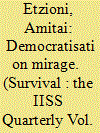

|
|
|
|
|
| Summary/Abstract |
One is reluctant to publish an essay that suggests that the families who lost their loved ones in Afghanistan and Iraq (as well as in Vietnam) – and the even larger numbers who have been maimed there – made these sacrifices in vain. As a former combatant, I know this grief closely. However, a clear-eyed view might prevent even more bloodshed and grief. And so, with much sadness, it must be observed that these sacrifices did not serve to bring about liberal-democratic, pro-Western regimes in these and other nations in the Middle East and Africa. Nor did these sacrifices make the United States safer or contribute to world peace. It is time to lay to rest the 100-year-old Wilsonian drive to democratise the world. Once we let go of that seductive but false hope, we will see the radical changes that can and must be made in US foreign policy and in that of its allies.
|
|
|
|
|
|
|
|
|
|
|
|
|
|
|
|
| 3 |
ID:
141127
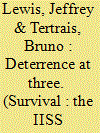

|
|
|
|
|
| Summary/Abstract |
Following Russia’s annexation of Crimea and aggression against Ukraine, members of NATO are again pondering the strength of Western deterrence. Over the course of the Ukraine crisis, President Vladimir Putin has repeatedly emphasised the potency of Russian nuclear weapons, announced new nuclear-weapons programmes and brushed off accusations that Russia is cheating on a number of arms-control agreements. Most ominously, Putin has declared that he would have been prepared to place Russian nuclear forces on alert – which implies threatening their use – had the annexation of Crimea met with serious resistance.
|
|
|
|
|
|
|
|
|
|
|
|
|
|
|
|
| 4 |
ID:
141134
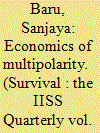

|
|
|
| 5 |
ID:
141131
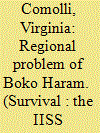

|
|
|
|
|
| Summary/Abstract |
‘Boko Haram is a typical example of small fires causing large fires’, declared retired general Muhammadu Buhari in his inaugural speech as Nigeria’s new president on 29 May 2015. The analogy was apt. From its inception in the early 2000s, the group has evolved from an isolated, broadly non-violent sect to a brutal, Islamist insurgency engaged in terrorism and criminality.
|
|
|
|
|
|
|
|
|
|
|
|
|
|
|
|
| 6 |
ID:
141129


|
|
|
|
|
| Summary/Abstract |
In a 2005 interview, former Soviet Western Group of Forces commander Matvei Burlakov said that the peak of the Cold War came in the 1980s. In a crisis, he asserted, Soviet plans were to strike pre-emptively, when tensions first started to rise. All that remained was for the signal to be sent and the Western Group of Forces would be the first to act. Burlakov also insisted that the Soviet Union would have been the first to employ nuclear weapons in such a scenario: ‘[Soviet foreign minister Andrei] Gromyko may have said one thing, but the military had other ideas.
|
|
|
|
|
|
|
|
|
|
|
|
|
|
|
|
| 7 |
ID:
141130


|
|
|
|
|
| Summary/Abstract |
One of the arguments most often raised against the emerging Iran nuclear deal is that it will prompt a proliferation cascade in the region. For years, many observers have worried that if Iran got too close to being able to produce nuclear weapons it would stimulate a similar effort by Saudi Arabia, which in turn might encourage Egypt and others to follow suit. Seven years ago, the IISS released a strategic dossier addressing this issue, entitled Nuclear Programmes in the Middle East: In the Shadow of Iran.
|
|
|
|
|
|
|
|
|
|
|
|
|
|
|
|
| 8 |
ID:
141128
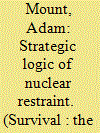

|
|
|
|
|
| Summary/Abstract |
It is manifestly in the American interest that nuclear weapons are never again used in war – but if they are, should the United States retaliate in kind? In many ways, US nuclear policy still labours in the shadow of Cold War deterrence models, yet a new concept of nuclear escalation is coming to dominate strategic planning. Today, there is little risk of a massive, disarming strike of the sort that kept Cold War presidents awake in the night. Instead, strategists worry that a regional adversary could use a nuclear weapon in an attempt to offset US conventional superiority and truncate an escalating conflict on favourable terms. This concept of nuclear use, referred to here as ‘offset escalation’, not only makes it more difficult to manage crises with regional nuclear powers, but also changes how strategists should think about what to do if deterrence fails.
|
|
|
|
|
|
|
|
|
|
|
|
|
|
|
|
| 9 |
ID:
141126
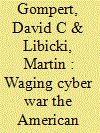

|
|
|
|
|
| Summary/Abstract |
‘War is cruelty, and you cannot refine it,’ said William Tecumseh Sherman.1 As we have previously argued in this journal, cyber war is war.2 Whether it is cruel and unrefined depends on the manner in which it is waged.3 While this is not solely up to the United States, US policy can have big effects. Yet, if US policy on offensive cyber war is influential, it is also inchoate. While some vagueness about when and how the United States would conduct offensive cyber operations is necessary, its general policy on this matter warrants debate. This article is meant to inform such a debate.
|
|
|
|
|
|
|
|
|
|
|
|
|
|
|
|
|
|
|
|
|